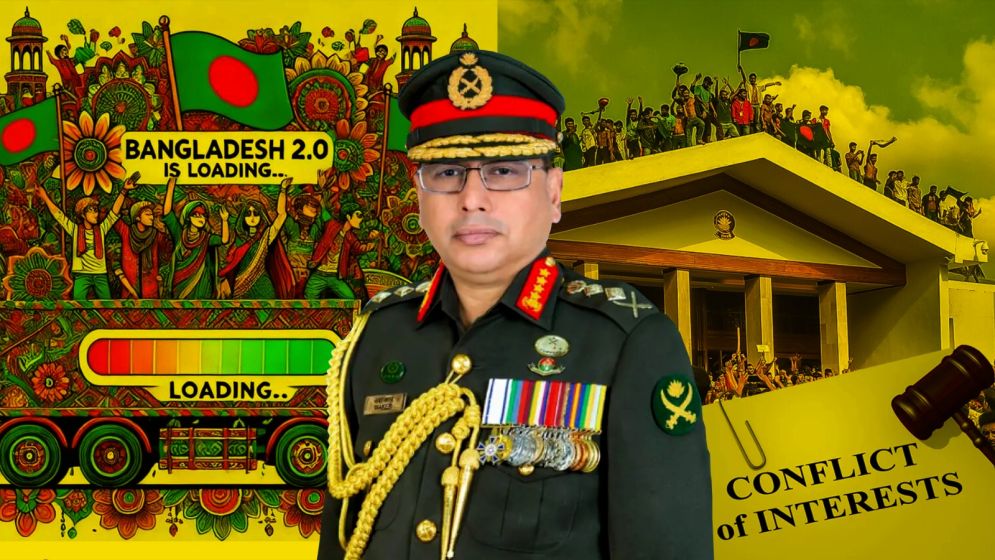Gen Waker-Uz-Zaman's conflicts of interest: Ally or obstacle to Bangladesh 2.0?

As admiration for General Waker-Uz-Zaman grows among influential intellectuals, it’s crucial to consider whether this rising reverence could be masking a deeper conflict of interest that might shape the future of Bangladesh 2.0.
This article delves into Waker’s background, connections, and actions, raising important questions about his role as the current Chief of Army Staff (CAS) of the Bangladesh Army.
General Waker is notably linked to Sheikh Hasina’s family through marriage. His father-in-law, General Mustafizur Rahman, served as the 9th CAS and was appointed to the position by Hasina herself.
A close ally of the Prime Minister, General Mustafizur was promoted to the rank of four-star general just before his retirement—an unprecedented move in the history of Bangladesh’s military, which sparked considerable debate at the time.
This familial connection to Hasina’s inner circle has cast a long shadow over General Waker’s military career from the very beginning.
Early on, Waker garnered the attention of senior officers, particularly General Iqbal Karim Bhuiyan (IKB), a former CAS with close ties to Hasina.
Under IKB’s mentorship, Waker was promoted to two-star general in 2013. His swift rise and favorable position within the military have raised questions about how political alliances may have shaped his career trajectory.
Looking at Waker’s career path, it is clear that he has enjoyed a privileged standing within the army. As the Sheikh Hasina-led government solidified its one-party dominance, it seems evident that Waker was being groomed for the role of CAS.
His appointment as Principal Staff Officer in November 2020 signaled that he was being prepared for the top military position—a move that many had expected, given his close ties to Hasina’s network.
While Waker is widely respected for his abilities as an officer and has largely avoided major corruption allegations, his career progression appears to have been carefully managed within an increasingly autocratic system.
This long-term grooming raises concerns about his ability to act independently and whether he can fulfill the role of a military leader with the objectivity expected in a democratic society.

Intellectual caution in military
leadership discourse
The silence of Bangladeshi intellectuals regarding military leadership is far from a new phenomenon; for years, the military has largely been shielded from public criticism.
However, investigative journalist Zulkarnain Saer has broken this tradition by exposing several dark chapters of the military's operations through his reporting.
Saer’s boldness in shedding light on the army's inner workings has been invaluable, offering the public a rare and much-needed glimpse into the institution.
Yet, even Saer’s critiques appear more reserved when it comes to General Waker, subtly indicating the sensitivities surrounding his position and influence.
In the wake of the unrest caused by the Monsoon Uprising and the subsequent collapse of Sheikh Hasina’s authoritarian regime, Waker has likely been focused on restoring order within the military.
His regular public appearances and visits to military facilities suggest an intention to stabilize the chain of command.
However, Saer’s recent critiques hint that Waker may be protecting individuals loyal to Hasina’s agenda, suggesting potential ulterior motives behind his actions.
As Chief of Army Staff (CAS), Waker’s role should be apolitical. Yet recent reports suggest he may be lobbying to extend the tenure of senior military commanders appointed during Hasina’s time in power.
Such actions undermine expectations for a break from authoritarian rule and raise concerns about the perpetuation of a leadership structure loyal to the previous administration.
Waker’s involvement in prolonging the service of these Hasina-appointed senior officers reveals a clear conflict of interest, especially if his actions are aimed at safeguarding individuals whose promotions were closely tied to Hasina’s approval.
This interference threatens to undermine the military’s independence, delaying much-needed reforms and impeding its ability to align with the ideals of a democratic Bangladesh.

August 5 and the battle for control
Since taking office as Chief of Army Staff in June, General Waker has been confronted with a challenging internal dilemma: how to balance his loyalty to Hasina’s supporters with his duty to safeguard national security.
This struggle became more evident in July, when widespread violence erupted under Hasina’s administration. On August 2, Waker addressed the army, visibly uneasy as he tried to stabilize the military amid growing tensions.
Speculation has suggested that he feared a mutiny similar to the one in November 1975, while others believe international pressure may have influenced his actions to enforce discipline within the ranks.
However, his silence during the July violence speaks volumes about his loyalties. The General’s hesitant speech, coupled with vague promises of order, underscored the ongoing tension between his responsibilities as a military leader and his allegiances within the army.
In a move that raised eyebrows, General Waker gave an interview to Reuters after the uprising, discussing election timelines—an issue well outside the military's purview.
By engaging in political discourse, Waker compromised his neutrality as Chief of Army Staff and undermined the army’s role as a nonpartisan institution.
In an already delicate political climate, his remarks not only overstep the boundaries of his position but also risk further destabilizing an already volatile national situation.
Waker’s actions, affiliations, and political interventions raise significant concerns about his commitment to a reformed, democratic Bangladesh.
His close ties to Hasina’s regime, combined with his reluctance to push for meaningful reforms within the military, suggest that his loyalties may lie with those benefiting from the current power structure.
If he continues to protect a senior military command loyal to Hasina, Waker’s leadership could impede the army’s transformation into a neutral institution that serves the interests of a free and democratic Bangladesh.
Ultimately, General Waker faces a pivotal choice: uphold his allegiance to Hasina’s inner circle or embrace the vision of a democratic and reformed Bangladesh.
His decision will shape his legacy and determine whether the military can fulfill its role as an impartial force committed to the national interest.
If Waker fails to prioritize the country’s needs over personal ties, it may be time for a change in leadership—one that better reflects the aspirations of Bangladesh 2.0.
—-
Adil Mahmood is a former journalist

